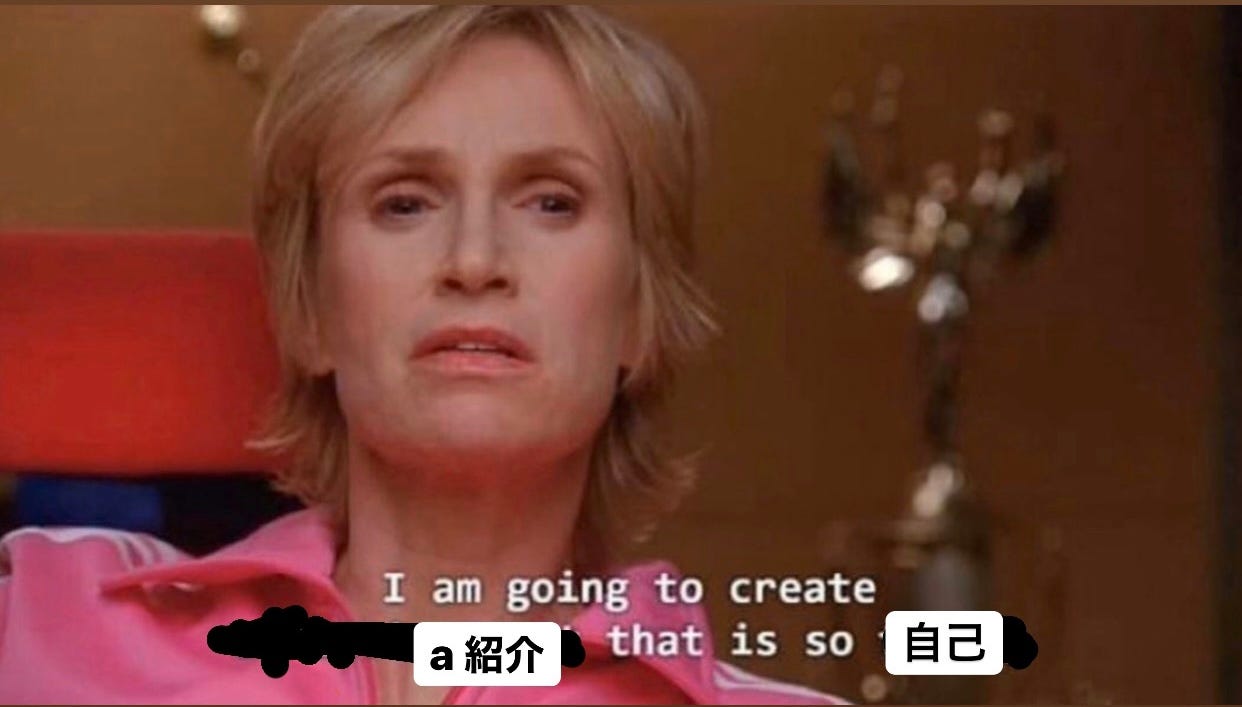就職活動
Get a job! - How to Japanese - June 2022
This is How to Japanese, a monthly newsletter with something about Japan/Japanese and a dash of いろいろ.
日本・日本語: Job Hunting in Japan
When I finished on the JET Program and was job hunting, I somehow talked my way into an interview with Panasonic as a 新卒 (shinsotsu, new graduate) without even realizing it. It was 2008, and I showed up at the CareerCross job fair in Yurakucho wearing a suit and went around asking if I could talk with people, more or less.
When I approached 松下電器 (Matsushita Denki, the former incarnation of Panasonic Holdings Corporation), there were two executives at the booth and one foreigner kind of gatekeeping out in front. The booth itself was roped off. I have no idea what I said, but being so forward about my interest kind of took the person by surprise. They weren’t sure exactly what to do but eventually turned back toward the executives and somewhat hesitantly let me in past the ropes. I think it helped that there was no one else in the vicinity at that time.
Three years earlier, I’d attended the Boston Career Forum, one of the biggest Japanese job fairs in the world. Japanese companies use the forum to target Japanese bilinguals who have been studying in the U.S. Some people even fly over from Japan for the chance to get the ultimate prize: 内定 (naitei, a tentative offer of employment). I had friends from England fly in, and two of them left with jobs. Another was traumatized after half a day of Japanese practice, and the last one and myself gave it ye olde college try but were ultimately unsuccessful. (My major memory from that career fair is nearly landing a trip to Japan for an interview with a tobacco company. I chose a random company as a kind of practice run, and after talking with them, I vaguely remember the interviewer saying, “Well the next step would be having you come to Japan for a formal interview…”)
So I knew that it was possible to get a job, even if only through sheer force of personality, although I will admit I had no idea what kind of work I wanted to be doing. Three years later, once I got past the ropes in Yurakucho, I did what I could: I gave a short self introduction and talked about my experience studying Japanese and working in Japan, said that I was willing to do any kind of work but that maybe marketing would suit my skills? I ended up with an interview in Sendai about a month later, which was one of the strangest job hunting experiences I’ve ever had.
After a beef tongue teishoku, I brushed my teeth in the bathroom somewhere and went to the interview. This is all I was given in terms of material to prepare:
■当日の持ち物について■
1.証明写真1枚(4cm×3cm)
2.筆記用具
3.学生証
4.自己PRするモノ
※学生時代に取り組んだ事や自分自身を表現するモノを1点お持ちください。
尚会場にはPCやスピーカー、電源設備はありませんのでご了承ください。
Here’s the English:
- What to bring to the interview -
1. One photo of yourself (4 cm x 3 cm)
2. Writing implement
3. Student ID
4. Personal appeal item
*Bring one thing that demonstrates something you put effort into as a student or expresses who you are.
Please note that there will be no equipment like computers or speakers at the interview location.
I wracked my brain about what to include for the last item, and in the end decided to print out a PowerPoint presentation I’d given about Japanese beer tax laws for my final Japanese class. That gave me the opportunity to talk about my interest in brewing and present a data-based research project I’d completed. Japanese beer tax was X% greater than the tax in other countries, which causes Y, resulting in Z.
I was brought into the interview room with two other candidates at the same time, and we were each given a few minutes to give give self-introductions, answer a few questions, and then present our items to a panel. I remember vividly that one guy brought a baseball cap, which represented his college club activity. I don’t remember what the last guy brought. When I finished, I had the sense that I hadn’t done well. I hadn’t allotted my time effectively, so the presentation was lackluster.
But in the end I passed the interview and was offered a second interview in Osaka…which I unfortunately turned down. I had already taken a position with a small translation company in Tokyo, and at the time I didn’t have (still don’t have?) the live-and-let-die job hunting attitude that it sometimes takes to make it in the business world. Keep interviewing until you get an offer you want, especially if the initial offer pays you less than JET wages.
But I don’t regret anything: Ending up at that translation company put me on the path to where I am now, which has been the only path I could take, and while it’s taken me years, I do finally feel like I’m comfortable on that path and have learned to even enjoy/appreciate the challenges that I’ve encountered along the way.
And I’m actually heading to Osaka this August for a shiny new job that I’m very excited about, so maybe I was meant to end up in Kansai after all, just on an extended timeline.
I do know that my language skills, cultural familiarity, and overall workplace functionality at the time were not sufficient to make it at a Japanese company. I also know that the game has changed. In 2008, JET CIRs were some of the few (although obviously not the only) foreigners with impressive language skills. Anki had only been created two years prior, and AJATT had only been online for a year. The self-study boom was just getting started. You need a much more 真面目 (majime, serious) approach than my 呑気な (nonki na, easy going) job hunting and Japanese study attitude in 2008. I like to think I found that in the past 14 years.
I have a few takeaways from this 就職活動 (shūshoku katsudō job hunting) experience, so I thought I’d share a few here.
It is critical to master a variety of flawless 自己紹介 (jikoshōkai, self introductions). You need a five-second, a 30-second, a two-minute, and then a five- to 10-minute introduction for a variety of different situations. I give myself a B+ for my preparation. I prepped for interviews using the Ask a Manager method (the PDF at the link is absolutely worth downloading), scripting out answers to questions about my past work. In addition to basic interview questions (“Tell us about your weaknesses/strengths.”), I had a response to “Tell me about your experience working at X” for each resume item in both English and Japanese that I practiced delivering. The one thing I would do differently if I did it again would be to practice delivering all of these integrated together with more of an overall flow; a five- to 10-minute introduction that goes through my full resume concisely, taking opportunities to pitch my skills and explain my interest in Japan/Japanese. I think I managed to do this on the spot several times, but I also think I could do it more successfully now that I’ve done it a few times (which I guess makes sense).
All the Japanese email language you need is out there on the internet. I unfortunately will not have the space this month to go over specific examples, but I am thinking here of basic stuff: how to respond to an interview invitation, how to thank them after the interview, how to respond to a second interview invitation, how to accept a job, how to communicate to other employers that you’re withdrawing from their interview process because you’ve been offered a job. There are set phrases and vocab for all of these, and the websites are all out there. I’ll give the same advice I’ve given before: Don’t get out over your skis. Don’t use patterns that feel excessive or ornate. Use language that feels somewhat familiar. Incorporate new phrases into patterns you’re already familiar with, and use quotation marks to isolate phrases and make sure your usage resembles what’s out there online. You can usually find examples of what you need by describing it in Japanese and adding 例文 (reibun, example sentences) on the end.
Prioritize what you want. I found the recruiters to be friendly and supportive but very eager. They will want you to take the jobs they find for you. Some of these will be 派遣 (haken, agency-based temp work) or 契約 (keiyaku, contract) positions. If that’s not something you’re interested in, then you should be clear. Be willing to take interviews, but tell the recruiters that you will need to be convinced. The benefit of 派遣 work is that the recruiting company will sponsor your work visa. In one case, the company noted that I would need to cover the fee but that after six months they would return the cost to me. There do seem to be a good number of translation jobs out there right now.
Have fun! Make sure you’re enjoying the process. See if you can mentally transform it into an opportunity rather than an obstacle or obligation.
いろいろ
As always, Katrina is worth a follow. These are all ideas I’ve gradually internalized, but I’ve never seen them so clearly presented.
“Siberia” (シベリア) are worth seeking out. I asked the guy at the store if they are originally from Yokohama, but he said it was likely Tokyo, though no one knows. He also noted that they aren’t being produced very widely anymore. A couple folks corrected me and noted that this is not あんこ (anko, red bean paste) but 羊羹 (yōkan, jellied red bean paste).
I love the Mizonokuchi area. This izakaya just northeast of there was a fun little spot in a great neighborhood, and somewhat strangely it was filled with customers in their 20s and 30s. I was one of the older folks.
I was in the JT this month. I'll be taking a little break from the Bilingual page while I settle into the new job.
I also did a little thread to celebrate the sixth anniversary of my article on Japanese craft beer in the JT.
This month I also finally went up the Sky Tree. It's fun, and worth a visit, but my hot take is that seeing the building up close from the ground is more impressive than the view from the top. I’m not even sure how we can build structures like that. It’s incredible.













